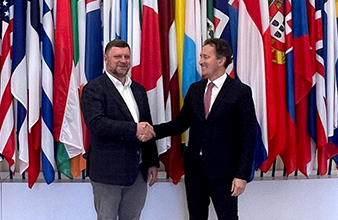SIGMA
Our expertise

Our updates
-
Organisational structure of budget management (SIGMA Paper No.72, July 2024)
11 July 2024
-
Salary systems in public administration and their reforms (SIGMA Paper No.71, June 2024)
20 June 2024
-
SIGMA Policy brief - The audit of political party financing by supreme audit institutions
10 June 2024
-
Inter-municipal co-operation in the Western Balkans (SIGMA Paper No.70, June 2024)
6 June 2024
-
Casebook: Public Procurement Law in Practice (SIGMA Training resources, May 2024)
13 May 2024
SIGMA at a glance

Reforming public administrations
Support for Improvement in Government and Management has been working with partner public administrations on strengthening their public governance systems and capacities since 1992.
Principles of Public Administration

A framework for good public administration
The Principles were first developed in 2014 to set out in practice what a well-functioning public administration looks like. A revised edition was published in November 2023 that updates the framework in line with the most recent standards and practices.
News & Events

Data Protection Academy for the Western Balkans and Eastern Partnership Region (9-13 September 2024)
Representatives from data protection authorities across both regions met in Brussels for the 2nd data protection high-level exchange and learning week. Under the patronage of the European Commission and supported by SIGMA, GIZ, RCC and ReSPA, this initiative aims to deepen partnerships of both regions with EU counterparts in the realm of data protection.

Organisational structure of budget management, SIGMA Paper No.72
This paper studies the organisation of budget management in selected government administrations in the Western Balkans and the Republic of Moldova, comparing them with good practice across the EU. It highlights the fragmentation in the administrative classification among SIGMA partners and its adverse impact on the implementation of advanced public financial management practices.

Salary systems in public administration and their reforms, SIGMA Paper No.71
Public sector salary systems are shaped by administrative culture, economic and political conditions. With insights from EU Member States, SIGMA partners in the Western Balkans, Moldova and Ukraine, this paper explores key concepts and provides guidance on the process of reforming public sector salary systems to enhance their competitiveness, equity, transparency and affordability.

Head of SIGMA meets the Deputy Speaker of the Verkhovna Rada of Ukraine
On 13 June, the Head of SIGMA met the Deputy Speaker of the Verkhovna Rada Mr Oleksandr Kornienko to discuss ongoing support for modernisation of the public administration. Various aspects of public service and HRM were discussed in light of Ukraine’s European integration process. SIGMA will continue to provide any support that Ukraine might need in the field of public governance.

Inter-municipal co-operation in the Western Balkans, SIGMA Paper No.70
Inter-municipal co-operation (IMC) is an efficient instrument for solving several issues at the local government level, in small to large-sized municipalities. This paper summarises IMC examples from EU and OECD countries and offers recommendations specific to the Western Balkans by analysing the legislative basis, support and incentives and practical data of IMC in the region.
.jpg)